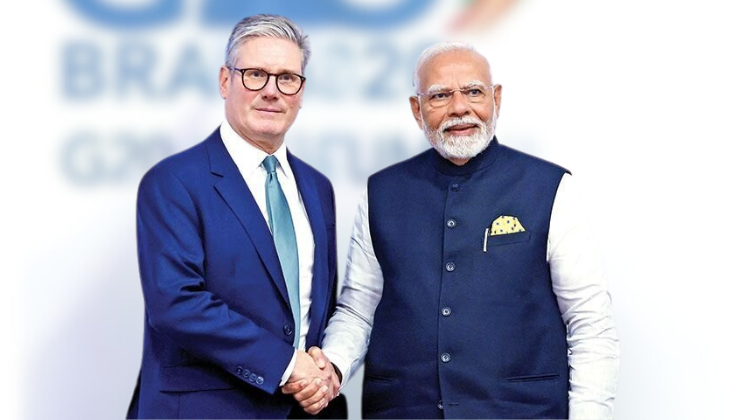India and the UK have finally concluded a free trade agreement which Prime Minister Narendra Modi, in a post on X, called “ambitious and mutually beneficial”, which will strengthen the two countries’ comprehensive strategic partnership and spur investment and trade. He made the remarks after a conversation with his British counterpart Kier Starmer.
The leaders of both countries characterised it as a historic turning point in the bilateral Comprehensive Strategic Partnership, which would promote investment, commerce, innovation, and the creation of jobs in both economies. Both agreed that the historic accords between the world’s two largest and free-market economies will boost economic links, expand business prospects, and develop interpersonal relationships.
In order to create a more robust and secure economy, PM Starmer stated that their Plan for Change includes lowering trade barriers and fortifying ties with economies across the globe.
This news was also warmly welcomed by India’s textile industry, with experts calling it a landmark agreement.
K.M. Subramanian, the President of the Tirupur Exporters’ Association said that the agreement could lead to apparel exports from Tirupur to increase around 20 per cent. He further added that the India-UK Free Trade Agreement is a game-changer for the textile sector. It unlocks new export avenues, reduces trade barriers, and empowers India’s weavers and manufacturers to access the premium UK market. This pact strengthens India’s position as a global textile hub, aligning with PM Modi’s vision of showcasing Indian craftsmanship and innovation on the world stage. Tirupur will especially benefit from the agreement, he continued, saying that the UK will be a buying hub for all of Europe.
Confederation of Indian Textile Industries’ (CITI) Former Chairman, Sanjay K Jain highlighted the key points of the agreement, concluding that in terms of tariff reductions, the UK will eliminate tariffs on Indian textile imports, among other items. Indian workers in the UK will be exempted from national insurance contributions. The agreement simplifies the approval process for business-related travel, facilitating smoother operations for companies. The FTA will boost the economy of the UK by up to US $ 6.68 billion annually, making it the most significant trade deal since Brexit , according to the UK Government.
According to their analysis, leather/footwear items and textile/apparel goods will now have zero duty under the new FTA.
Dr S K Sundararaman, Chairman, The Southern India Mills’ Association (SIMA) has lauded the Union Government for arriving at the historical trade agreement with the UK. According to him, home textile exports, particularly kitchen linen from clusters like Karur that have been hampered by the tariff disadvantage compared to nations like Pakistan will soon be able to increase their exports to the UK. He went on to say that as the UK is the second-largest market for ready-made clothing, the zero tariff access would result in significant value chain investments. According to him, the nation will be able to quickly seize the export prospects presented by the India-UK Free Trade Agreement and employ 20 to 30 per cent of the excess production capacity across the whole textile value chain.
Dr. Mukesh Kansal, Chairman, CTA Apparels – a manufacturer of sustainable garments and textile products – welcomed the conclusion of the India–UK Free Trade Agreement and the Double Contribution Convention. He added that for the textile and apparel industry, these agreements unlock fresh opportunities by reducing tariff barriers, encouraging technology exchange, and enhancing market access.
Lauding the deal, Sudhir Sekhri, Chairman, Apparel Export Promotion Council (AEPC) said that this landmark FTA between India and the UK is expected to boost RMG exports and help in employment generation. Further, Sekhri noted that India is the 4th largest supplier of garments with 6.1 per cent share of the total RMG import of the UK. RMG exports to the UK from India grew by 7.8 per cent between April-March 2024-25 compared to April-March 2023-24. The total RMG exports to the UK amounted to US $ 1.4 billion during the same period. With this deal in place, India is poised to double RMG exports to the UK in the next three years. The top products imported by the UK from India include T-shirts, singlets and other vests of cotton, knitted or crocheted; Women’s or girls’ dresses of cotton; Babies’ garments and clothing accessories of cotton, knitted or crocheted, he added.
UK is one of the most lucrative and growing markets for Indian textile and apparel exporters, said Santosh Katariya, President, Clothing Manufacturers Association of India (CMAI), adding that post the latest US tariff announcement, there was a strong need to diversify textile exports and with this FTA agreement, India’s knitted and woven apparel can now gain substantial foothold in the UK market. By emphasizing on sustainability, quality and digital marketing, not just Indian exports but Indian brands will also get an opportunity to stand out with reduced prices for UK consumers.
Rajeev Gupta, Joint Managing Director of RSWM Ltd., said the India–UK FTA is a landmark achievement. By eliminating tariffs on nearly all Indian textile and apparel exports to the UK, this historic pact will provide an unprecedented boost to India’s labour-intensive sectors. The UK is one of the largest apparel importers, sourcing nearly US $ 19–20 billion worth of goods annually. The FTA eliminates the tariffs of up to 12–16 per cent levied on Indian textiles, garments, footwear and carpets, instantly boosting the industry’s competitiveness and export potential. A sharp surge in trade volumes is being expected, with nearly 99 per cent of Indian exports to the UK, covering almost the entire value of current exports, becoming duty-free. “At RSWM Ltd., we see this as a golden opportunity to deepen our footprint in the UK market, strengthen supply chain linkages, and scale up value-added offerings. Also, reduced tariffs on UK-origin technical textiles and high-end fabrics will bring advanced materials into India, further enriching our domestic capabilities”, he added.







